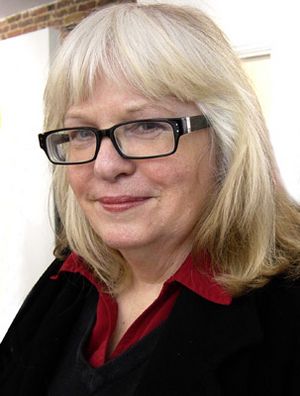Alexis Hunter facts for kids
Quick facts for kids
Alexis Hunter
|
|
|---|---|
 |
|
| Born |
Alexis Jan Atthill Hunter
4 November 1948 Auckland, New Zealand
|
| Died | 24 February 2014 (aged 65) London, England
|
| Nationality | New Zealand |
| Alma mater | Elam School of Fine Arts |
| Known for | Photography, painting |
| Movement | Stuckism |
| Spouse(s) | Baxter Mitchell |
Alexis Hunter (born November 4, 1948 – died February 24, 2014) was a talented artist from New Zealand. She was both a painter and a photographer. Her art often explored ideas about women's rights and roles in society. Alexis lived and worked in London, UK, and also in France. She was also part of an art group called Stuckism. Today, her art and writings are looked after by the Alexis Hunter Trust.
Contents
Early Life and Education
Alexis Hunter was born in Epsom, Auckland, New Zealand. Her parents had moved there from Sydney in 1947. She grew up in Titirangi, a beautiful area in Auckland. Alexis also had a twin sister, Alyson Hunter, who is also an artist.
From 1966 to 1969, Alexis studied art at the Elam School of Fine Arts. A teacher there, Colin McCahon, taught her that artists have a duty to help society. This idea greatly influenced her work. In 1971, she earned a diploma in art and history.
Artistic Career
In 1972, Alexis moved to London, England. She worked in film animation and joined groups that supported women artists. She said it was hard to get her art shown because people didn't take women's art seriously back then.
Exploring Tattoos in Art
Alexis became interested in European tattoos after hearing a lecture that didn't respect their cultural meaning. She knew that tattoos were very important in Māori culture in New Zealand. So, she started taking photos of men with tattoos on the street. Some people reacted badly, but she didn't let that stop her.
Hands and Identity in Art
Alexis often used images of hands in her artwork. In her series The Marxist Housewife (Still Does the Housework) (1978), she showed a perfectly manicured hand cleaning a poster of Karl Marx. This art piece talked about social classes and how Marx's ideas didn't really include the hard work women did at home.
Another series, Identity Crisis, featured six photos of Alexis herself. Each photo was taken by a different person over two weeks. This showed how different people saw her, from wearing a pearl necklace to a strong pose in a hard hat. She also photographed men to change the usual way women were shown in art.
Exhibitions and Recognition
In 1978, Alexis had a photo exhibition called Approaches to Fear in London. Her work was shown in many important galleries, including the Hayward Gallery and the Serpentine Gallery. She also had exhibitions in New York and New Zealand.
In the early 1980s, Alexis returned to painting. She used painting to explore ideas about psychology and fantasy from a woman's point of view.
In 2007, there was a special show of her older works called Alexis Hunter: Radical Feminism in the 1970s. This show helped people see how important her art was to the women's art movement in Britain. Alexis said that in the 1970s, artists felt they could change society through their art.
Her work was also part of a big exhibition in Los Angeles in 2007 called WACK! Art and the Feminist Revolution. In 2013, the famous Tate Gallery bought one of her works, Approach to Fear XIII: Pain – Destruction of Cause 1977.
Alexis also taught art at universities in the UK and was a visiting professor in Texas.
Personal Life
Alexis Hunter was married to Baxter Mitchell. He owned a jazz bar in Camden, London, which supported many new bands in the 1980s.
Legacy
Alexis Hunter's art continues to be important even after her death in 2014. Her work has been shown in new exhibitions and bought by major art museums.
- 2016: An exhibition at the Museum of New Zealand Te Papa Tongarewa called "The Model's Revenge."
- 2018: An exhibition at Goldsmiths, University of London.
- 2021: The Tate gallery bought another of her works, Approach to Fear XVII.
- 2022: An exhibition at The Margate School called "Passionate Instincts: paintings and boards from New Zealand days 1976 - 1988."
Work in Collections
You can find Alexis Hunter's art in many important collections, including:
- Tate Modern
- Scottish National Gallery of Modern Art
- Museum of New Zealand Te Papa Tongarewa
- University of Otago
- Arts Council of Great Britain
See also
- Sarah Kent
- Mary Kelly
- Lucy Lippard
- Feminist Theory
 | Precious Adams |
 | Lauren Anderson |
 | Janet Collins |

